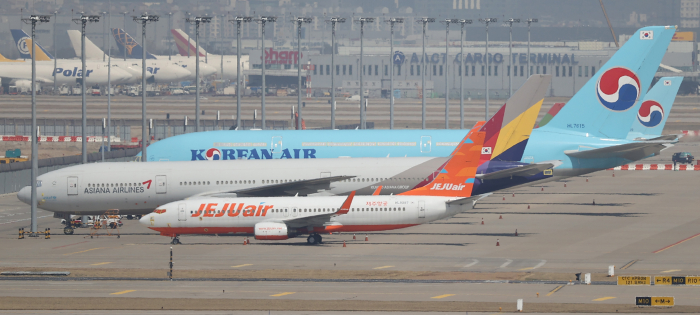Korean Air eyes $350 mn in cost savings from Asiana merger
By Apr 01, 2021 (Gmt+09:00)
LG Chem to sell water filter business to Glenwood PE for $692 million


Kyobo Life poised to buy Japan’s SBI Group-owned savings bank


KT&G eyes overseas M&A after rejecting activist fund's offer


StockX in merger talks with Naver’s online reseller Kream


Mirae Asset to be named Korea Post’s core real estate fund operator



Last year, the flag carrier agreed to take over Asiana for 1.8 trillion won, a deal set to create the world's seventh-largest airline.
Upon approval from antitrust regulators in South Korea and nine other countries, Korean Air will complete the acquisition and run the latter as a separate unit for the following two years, Korean Air's Chief Executive Woo Kee-hong said on Mar. 31. Then both entities will be merged under the Korean Air brand.
"In terms of profitability, we will be able to improve our profits by streamlining overlapping routes, providing additional connecting routes and maximizing the synergy from our combination," Woo told an online news conference.
"In terms of cost savings, we will achieve the economies of scale by making efficient use of facilities, aircraft, staff, terminals and sales networks, while improving our financial structure. This will save us financial expenses such as interest costs."
He said their merger will cut operational costs by 300 billion to 400 billion won ($265 million-$353 million) a year from the second year of their combination, once the airline industry returns to the pre-pandemic situation.
Their integration will require combinations of alliance programs formed with other countries' carriers, mileage services and IT and accounting systems, the CEO added.
For their budget carriers, Korean Air is considering combining the three low-cost carriers -- Jin Air Co., Air Busan Co. and Air Seoul Co. -- into one entity, under the control of either Korean Air, or its parent company Hanjin KAL Corp.
Their merger will make about 1,200 employees redundant, but Woo said the redundancy could be resolved through natural attrition, without layoffs.
In 2020, Korean Air posted 238.3 billion won in operating profit, a 17% year-on-year drop, despite a 40% tumble in revenue. Brisk cargo operations offset a drastic drop in passenger flights. In comparison, Asiana Airlines saw its operating loss reduced to 276.4 billion won, versus a 443.7 billion won loss in 2019.
Last month, Korean Air raised 3.32 trillion won from a new share sale in the the largest-ever rights offering by a domestic company. It will use 1.5 trillion won of the proceeds to fund its 1.8 trillion won acquisition of Asiana.
Write to Kyung-Min Kang at kkm1026@hankyung.com
Yeonhee Kim edited this article.
-
 [Exclusive] OTT streamingKakao joins OTT race with INISOFT acquisition
[Exclusive] OTT streamingKakao joins OTT race with INISOFT acquisitionMay 27, 2021 (Gmt+09:00)
3 Min read -
 Dairy productsHahn & Co. acquires controlling stake in Namyang Dairy Products
Dairy productsHahn & Co. acquires controlling stake in Namyang Dairy ProductsMay 27, 2021 (Gmt+09:00)
2 Min read -
 Music and entertainmentHYBE’s $400 mn rights offering for Ithaca merger to open June 1-2
Music and entertainmentHYBE’s $400 mn rights offering for Ithaca merger to open June 1-2May 26, 2021 (Gmt+09:00)
2 Min read -
 Stake salesSingapore sovereign fund GIC to buy 30% of Starbucks Korea for $710 mn
Stake salesSingapore sovereign fund GIC to buy 30% of Starbucks Korea for $710 mnMay 24, 2021 (Gmt+09:00)
1 Min read -
 M&A financingKorean Air raises $2.9 bn in largest-ever share issue by Korean firm
M&A financingKorean Air raises $2.9 bn in largest-ever share issue by Korean firmMar 07, 2021 (Gmt+09:00)
2 Min read -
 Rights offeringKorean Air kicks off biggest-ever rights offer to finance Asiana takeover
Rights offeringKorean Air kicks off biggest-ever rights offer to finance Asiana takeoverFeb 22, 2021 (Gmt+09:00)
3 Min read -
 Korean Air: Another earnings surprise in Q4 2020
Korean Air: Another earnings surprise in Q4 2020Feb 05, 2021 (Gmt+09:00)
3 Min read -
 Industry trendsSurvival of the fittest for Korean firms in COVID-19 era
Industry trendsSurvival of the fittest for Korean firms in COVID-19 eraFeb 15, 2021 (Gmt+09:00)
5 Min read -



